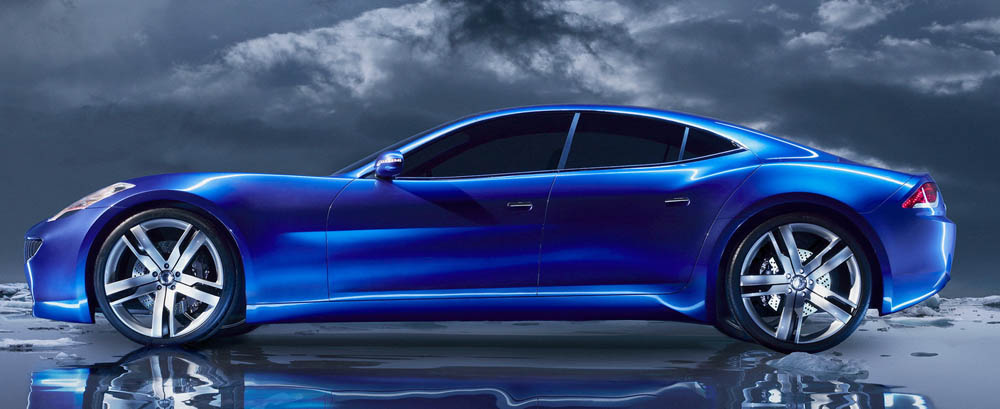" Tesla Roadster: electric cars can be sexy too Driving this morning, enjoying the feel of the Volvo's easy dealing with the deep puddles and burst river banks of the Somerset countryside, I stumbled upon a debate on the noble and "

Will Plug-in Hybrids Undermine the Grid?

US wires are buzzing (no pun intended) with an improbable angst over whether or not the next generation of Plug-In hybrids will put disastrous strain on the already over-stretched US national grid.
The 2010 Fisker Karma (pictured) and the 2011 Chevrolet Volt plug-in hybrids, among other electric-drive vehicles, are scheduled to roll out next year. The Nissan Leaf electric car (that comes without a range-extending engine) is also due for release in 2012, and will be even more reliant on plug-in power, so it’s a question worth asking.
While the Fisker is undoubtedly the nicest looking hybrid we’ve ever seen and has a chance of being sold in numbers, we doubt that even the oil-guzzling Americans are being a little hysterical over these anti-heroes of all-american motoring. Some local utility companies have however, apparently worried about the impact of “clusters of EVs in specific neighbourhoods where early adopters may live”.
Still, we suppose that the odd period of grid blackout may be a small price to pay for the atmosphere.
CLICK TO ENLARGE










What I've never understood about electric vehicles and the “save the planet” argument is: where does the electricity come from? A power station. What does the power station do to the planet? Damage it.
If the power station is more efficient at: converting oil to electricity, transmitting that electricity into a car, and the car using it to create motion – then OK there's a saving to be made but all these articles talk about electric vehicles as if you just plug them into a free, zero-environmental-impact energy source and then they drive round making zero emissions and we're all saved. It's a crock!
Interestingly a big part of the energy of the problem in California is that
thanks to the green sensibilities of the locals, no new CO2 generating
plants have been approved in the last 10 years. California already generates
about half of the CO2 per capita compared with the US average. The mix of
power sources in California includes only 52% fossil fuel, with 19% from
large hydroelectric plants (Hoover Dam), 17% nuclear and (12%) from other
renewable sources. Couple that with the fact that power plants are indeed
more efficient, and also offer better opportunities for emissions capture
(since they are all in one place), and the cleaner air on the streets, and
the benefits are clear.
David
2009/12/1 Disqus <>
“Couple that with the fact that power plants are indeed
more efficient…” That's what I'd like to see in figures. A typical IC engine has at best 30~40% thermal efficiency from tank to flywheel. You'll tell me it's running nowhere near that efficiency most of the time.
But to my knowledge a steam turbine like we find in power plants has a typical thermal efficiency of 40% at best. You'll tell me it always run at that rate. Yes, but it does so 24/7 and the energy generated that's not used is dumped… into street lights for example. That's why you occasionally see these lights on during the day. Then there's a little loss through the big transformers and long HT cables.
Then you charge a battery at an efficienc of 80~90%, that you discharge into an electric motor (made of mostly resin coated copper wire) at an efficiency of 70~85%.
All in all, if plug-in electric cars are not as bad as petrol ones, they're worse for the environment. I like the idea of a quiet car with instant torque, but it's actually better at producing performance toys than saving us! Unless someone proves we can generate the electricity with better efficiency and with the capacity to replace the equivalent of millions of petrol and diesel engines…
The key is not what we drive, but how much we drive it. Working from home, walking to the shops and having the occasional road trips with a fat V8 is more eco-friendly than commuting 20 miles per day in a Prius, as strange it may sound to some.
that's why whilst wanting to spare our planet, I still believe in automotive pleasure more than in “more technology to reduce the damage done by technology”.
Antonin why do you consider EV’s are worse for the environment? they make more efficient use of grid power even from dirty power stations compared to the wheel to well figures of petrol powered cars.
Check out this link for a simple explanation, also read some of the comments and answers…http://energy.typepad.com/the-energy-blog/2010/04/greenhouse-gas-emissions-electric-vs-gasoline-cars.html
The precious metals used in their construction are recycled, they have the ability to be fueled/charged by any number of sustainable forms of clean energy sources. You could charge for free with your own solar array, try that with your petrol powered car!
The car as we know it today has had over a century of developement and considering the short most recent concentration on electric car technology there is still a lot to come. Like everything in this world it comes gradually and if we are to retain personal mobility this is the way forward.
I agree our power stations should be clean regardless if EV’s are dependent on them or not.
The point is with electric cars there is the option of other ways to charge and by maintaining the present fossil fuel system there is not this flexibility.
Its a no brainer really but the debate usually reveals either ones beliefs that the glass is either half full or half empty or else they have an agenda like a vested interest in maintaining the status quo.